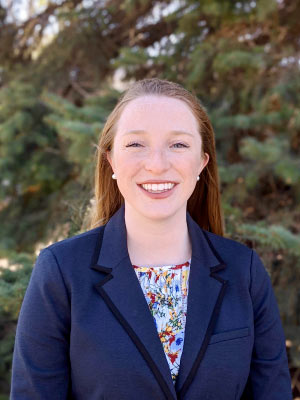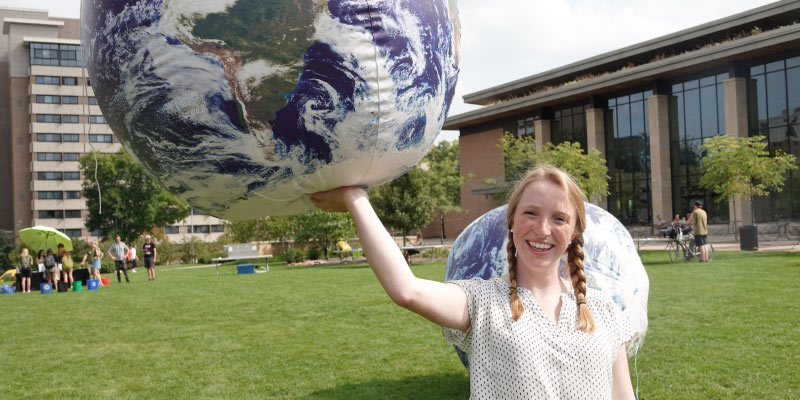
“Dear UW-Madison Students, Faculty, and Staff,
UW–Madison is developing a new sustainability strategy, and we need to hear from you to better understand sustainability literacy, culture, and demand in our campus community. Please complete the survey below to have your voice heard.”
If you were on campus last fall you likely received this email asking you to participate in a campuswide sustainability survey. This survey, along with many other sustainability initiatives across the University of Wisconsin–Madison campus, is one of the projects led by environment and resources PhD student Audrey Stanton. “Addressing these questions within our campus context is a critical component of my work,” Stanton says, “and understanding the connections between environmental, economic, and social factors is essential for effective decision-making and sustainable action at UW–Madison.”
Stanton grew up in Montana, where the outdoors were a big part of her childhood. “Anytime my brother and I were looking for something to do, we’d go outside and play in the grass with our dogs, dig in the garden, or explore the woods behind our house,” she says. Stanton lived in a glacial valley surrounded by mountains, and would frequently go hiking, camping, or swimming with her family — one of their favorite places to visit was Glacier National Park.
Stanton’s love for the outdoors grew into a love for the environment, thanks to her involvement with her high school’s environmental club. “I had a fantastic teacher who ran the environmental club and convinced me to join,” Stanton says. With the club, she helped manage the school’s recycling program and submitted a grant that funded a salsa garden for their high school, allowing students to grow tomatoes, cilantro, peppers, and other salsa ingredients. “I loved the work and I loved the people, so it was such an easy decision to continue my passion in college,” she says.
After earning her undergraduate degree in sustainability sciences from Cornell University, Stanton pursued a master’s degree in the Nelson Institute’s environment and resources program. During her master’s coursework, Stanton worked with Professor Emerita Cathy Middlecamp and one of her peers to create the Campus Sustainability Map for her master’s project. This map is based on the United Nations’ Sustainability Development Goals (SDGs), and showcases the variety of sustainability efforts being made across the UW–Madison campus. “The map shows a visual description of campus features that pertain to sustainability — whether that be social, economic, environmental, or a combination of the three,” Stanton says. “It’s been viewed over 17,000 times, which goes to show that people are using it and loving it.”
Now, she’s pursuing a PhD in environment and resources at the Nelson Institute as well. “One of my favorite things about the Nelson Institute is its interdisciplinary approach to education,” Stanton says. “Coming out of college I had two interests I wanted to pursue, sustainability and education, and the Nelson Institute is a place where I could do both,” she says. For Stanton, being part of a cohort consisting of people specializing in a variety of fields helps promote collaboration and tackling issues from a variety of perspectives. She says, “everyone brings their own expertise to the Nelson Institute, and we can all work together for a greater purpose.”

In addition to pursuing a PhD at the Nelson Institute, Stanton works as a project assistant with UW–Madison’s Office of Sustainability (OS). The OS was created in 2012 with a vision to establish campus as a living laboratory for sustainability — an idea recently solidified by UW–Madison’s new environmental sustainability initiative. With the OS, Stanton channels her passions for education and sustainability into promoting sustainability across campus — for example, through the Sustainability Symposium.
Currently, Stanton is working with the OS on analyzing responses from the campuswide sustainability survey, a longitudinal study that concluded in the fall. The team sent out two surveys — one in 2021, and another in the fall of 2023 — and Stanton is leading the efforts in analyzing how sustainability literacy and culture is progressing among UW students, staff, and faculty. “The survey supports our efforts to reach STARS [Sustainability Tracking, Assessment & Rating System] Gold by 2025” — one of the sustainability initiative’s goals — “while also providing insights into the effectiveness of sustainability engagement and education initiatives,” Stanton says.
This isn’t the only survey that Stanton has worked on — with the support of her PhD advisor Andrea Hicks and Nelson Institute Dean Paul Robbins, Stanton surveyed Nelson Institute staff to learn more about how the COVID-19 pandemic affected their commuting behavior. In particular, Stanton focused on how their travel habits impacted sustainability, benefiting people, the planet, and the economy. “The survey shows the staff overwhelmingly love to work in a hybrid manner,” Stanton says, calling the arrangement “a perfect solution” to balancing workplace productivity with transportation sustainability. “This truly is a campus as a living laboratory project, where Stanton is exploring how policies contribute to the carbon footprint of campus,” says Hicks.
Due to Stanton’s work in these various campus sustainability initiatives, she was named the 2023 Emerging Graduate Leader in Sustainability by the Upper Midwest Association for Campus Sustainability. After earning her PhD, Stanton hopes to continue doing place-based sustainability education work.
“I want to continue doing sustainability in education and outreach in whichever role I have post-grad,” Stanton says. “Something that’s important to me is supporting and encouraging the younger generations working in sustainability fields — as things get tougher, you have to keep fighting the fight.” One of the ways Stanton likes to “fight the fight” is by doing something that she and her coworkers at the OS call “sustaining the sustainers:” supporting the people working in sustainability so they can continue to support the environment. “We try to emphasize to folks that they’re people first, then they’re students, and then they’re interns. It’s important to find that balance to avoid burnout and keep pursuing the work you’re doing. Climate anxiety can be overwhelming, and we encourage students to take care of themselves, too,” she says.
How does Stanton navigate working in the stressful — and sometimes demoralizing — field of sustainability? “Even if I weren’t in this field of work I would still be thinking about sustainability issues regularly, so it brings me a lot of purpose to be part of the problem-solving. I find it very meaningful to be part of sustainable solutions in the face of climate change.”
Stanton’s efforts in working towards sustainable solutions exemplifies the intersection between passion, action, and education in sustainability. From working on projects like the Campus Sustainability Map, to conducting sustainability research through surveys, to “sustaining the sustainers” at the Office of Sustainability, Stanton’s work affects people across the UW campus and beyond.